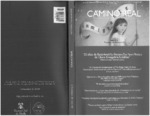Mostrar o rexistro simple do ítem
Queeremos a Gloria Anzaldúa: Identity, Difference, New Tribalism, and Affective Eco-Dialogues
| dc.contributor.author | Núñez-Puente, Carolina | |
| dc.date.accessioned | 2024-01-16T08:36:59Z | |
| dc.date.available | 2024-01-16T08:36:59Z | |
| dc.date.issued | 2018 | |
| dc.identifier.citation | Núñez Puente, Carolina. "Queeremos" a Gloria Anzaldúa: identity, difference, new tribalism, and affective eco-dialogues. Camino real: estudios de las hispanidades norteamericanas, 2018, v. 10, n. 13, p. 47-62. ISSN 1889-5611 | es_ES |
| dc.identifier.issn | 1889-5611 | |
| dc.identifier.uri | http://hdl.handle.net/2183/34915 | |
| dc.description.abstract | [Abstract] This article starts by conceptualizing Anzaldúa’s (and other thinkers’) approaches to poetry, queerness, identity, and difference from Borderlands (1987) to later works. Part two examines her thoughts on new tribalism, most of which appeared in Interviews/Entrevistas (2000), This Bridge We Call Home (2002), The Gloria Anzaldua Reader (2009), and Light in the Dark (2015). Both sections also describe the possible dialogues between her poetry and prose. Part three takes dialogical connections further, by putting Anzaldúa into an affective eco-dialogue (my term) with contemporary feminists. The article’s thesis is that Anzaldúa’s queer way of feeling-thinking-being has marked the style, themes, and goals of her oeuvre; furthermore, given her ability to go beyond binary oppositions by means of articulating difference in a triple affective, dialogical, and ecofeminist fashion, Anzaldúa must be considered a posthumanist philosopher. | es_ES |
| dc.description.abstract | [Resumen] Este articulo comienza conceptualizando los enfoques de Anzaldua (y otros/as pensadores/as) sobre poesía, “queerness”, identidad y diferencia desde “Borderlands” (1987) hasta obras posteriores. La segunda parte examina sus ideas sobre “new tribalism”, la mayoría de las cuales aparecieron en “Interviews/Entrevistas” (2000), “This Bridge We Call Home” (2002), “The Gloria Anzaldúa Reader” (2009) y “Light in the Dark” (2015). Ambas secciones también describen los posibles diálogos entre su poesía y su prosa. La tercera parte lleva las conexiones dialógicas más allá, poniendo a Anzaldua en lo que llamo un eco-dialogo afectivo con las feministas contemporáneas. La tesis del artículo es que la forma queer de sentir-pensar-ser de Anzaldua marco el estilo, los temas y los objetivos de su obra; además, dada su capacidad para ir más allá de las oposiciones binarias mediante la articulación de la diferencia de una manera afectiva, dialógica y ecofeminista, Anzaldua debe considerarse una filosofa posthumanista. | es_ES |
| dc.language.iso | eng | es_ES |
| dc.publisher | Instituto Franklin de Investigación en Estudios Norteamericanos, Universidad de Alcalá | es_ES |
| dc.relation.uri | http://hdl.handle.net/10017/33865 | es_ES |
| dc.rights | Atribución-NoComercial-SinDerivadas 4.o International | es_ES |
| dc.rights.uri | http://creativecommons.org/licenses/by-nc-nd/3.0/es/ | * |
| dc.subject | Affect theory | es_ES |
| dc.subject | Ecofeminism | es_ES |
| dc.subject | Dialogics | es_ES |
| dc.subject | Queer studies | es_ES |
| dc.subject | Gloria Anzaldúa | es_ES |
| dc.subject | Eco-diálogo afectivo | es_ES |
| dc.subject | Acercamiento queer | es_ES |
| dc.subject | Eco-feminismo | es_ES |
| dc.title | Queeremos a Gloria Anzaldúa: Identity, Difference, New Tribalism, and Affective Eco-Dialogues | es_ES |
| dc.type | info:eu-repo/semantics/article | es_ES |
| dc.rights.access | info:eu-repo/semantics/openAccess | es_ES |
| UDC.journalTitle | Camino real: Estudios de las hispanidades norteamericanas | es_ES |
| UDC.volume | 10 | es_ES |
| UDC.issue | 13 | es_ES |
| UDC.startPage | 47 | es_ES |
| UDC.endPage | 62 | es_ES |
Ficheiros no ítem
Este ítem aparece na(s) seguinte(s) colección(s)
-
GI-CLEU - Artigos [14]






